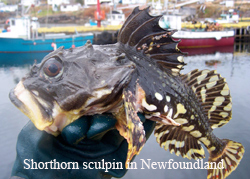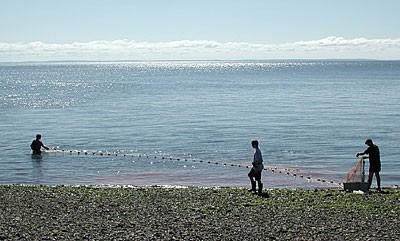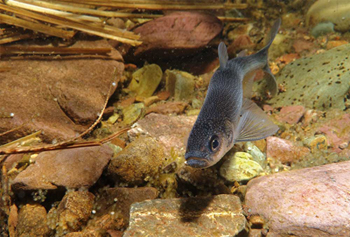Selected Publications
Bradbury, IR, S Bowman, T Borza, PVR Snelgrove, JA Hutchings, PR Berg, N Rodriguez-Expeleta, J Lighten, DE Ruzzante, C Taggart, P Bentzen. 2014. Long distance linkage disequilibrium and limited hybridization suggest cryptic speciation in Atlantic cod. PLOS ONE. 9(9): e106380. doi:10.1371/journal.pone.0106380
McBride, MC, TV Willis, RG Bradford, P Bentzen. 2014. Genetic diversity and structure of two hybridizing anadromous fishes (Alosa pseudoharengus, Alosa aestivalis) across the northern portion of their range. Conservation Genetics DOI 10.1007/s10592-014-0617-9
Lighten, J, C van Oosterhout, IG Paterson, M McMullan, P Bentzen. 2014. Ultra-deep Illumina sequencing accurately identifies MHC class IIb alleles and provides evidence for copy number variation in the guppy (Poecilia reticulata). Molecular Ecology Resources doi: 10.1111/1755-0998.12225
Lopez-Sepulcre, A, S Gordon, I Paterson, P Bentzen, D Reznick. 2013. Beyond lifetime reproductive success. The posthumous reproductive dynamics of male Trinidadian guppies. Proceedings of the Royal Society, Series B. 280: 20131116. http://dx.doi.org/10.1098/rspb.2013.1116
Hasselman, DJ, D Ricard and P. Bentzen. 2013. Genetic diversity and differentiation in a wide ranging anadromous fish, American shad (Alosa sapidissima), is correlated with latitude. Molecular Ecology doi: 10.1111/mec.12197
McCusker, MR, D Denti, L Van Guelpen, E Kenchington and P Bentzen. 2012. Barcoding Atlantic Canada’s commonly encountered marine fishes. Molecular Ecology Resources doi: 10.1111/1755-0998.12043
Jensen, PC and P Bentzen. 2012. A molecular dissection of the mating system of the Dungeness Crab, Metacarcinus magister (Brachyura: Cancridae). Journal of Crustacean Biology 32(3):443-456
Bradbury, IR, MW Coulson, SE Campana, IG Paterson and P Bentzen. 2011. Contemporary nuclear and mitochondrial DNA clines in a north temperate estuarine fish reflect Pleistocene vicariance. Marine Ecology Progress Series 438: 207–218.
Coulson, MW, D Denti, L Van Guelpen, C Miri, E Kenchington and P Bentzen. 2011. DNA barcoding of Canada’s skates. Molecular Ecology Resources doi: 10.1111/j.1755-0998.2011.03034.x
McCusker, MR and P Bentzen. 2010. Historical influences dominate the population genetic structure of a sedentary marine fish, Atlantic wolffish (Anarhichas lupus), across the North Atlantic Ocean. Molecular Ecology 19(19):4228-4241.
Bradbury IR, S Hubert, B Higgins, T Borza, S Bowman, IG Paterson, PVR Snelgrove, C Morris, R Gregory, DC Hardie, JA Hutchings, D Ruzzante, C Taggart and P Bentzen. 2010. Parallel adaptive evolution of Atlantic cod on both sides of the Atlantic Ocean in response to temperature. Proceedings of the Royal Society, Series B published online 30; June 2010 doi: 10.1098/rspb.2010.0985
McCusker, MR and P Bentzen. 2010. Positive relationships between genetic diversity and abundance in fishes. Molecular Ecology doi: 10.1111/j.1365-294X.2010.04822.x.
Bradbury, IR, MW Coulson, A Cook and P Bentzen. 2010. Evidence for divergence and adaptive isolation in post-glacially derived bimodal allopatric and sympatric rainbow smelt populations. Biological Journal of the Linnean Society. 101:583-594.
Hasselman, DJ, RG Bradford and P Bentzen. 2010. Taking stock: Defining populations of American shad (Alosa sapidissima) in Canada using neutral genetic markers. Canadian Journal of Fisheries and Aquatic Sciences. 67:1021-1039.
Bradbury, IR, SE Campana and P Bentzen. 2008. Otolith elemental composition and adult tagging reveal spawning site fidelity and estuarine dependency in rainbow smelt. Marine Ecology Progress Series doi: 10.3354/meps07583
Bradbury, IR, SE Campana, and P Bentzen. 2008. Low genetic connectivity in an estuarine fish with pelagic larvae. Canadian Journal of Fisheries and Aquatic Sciences. 65:147-158.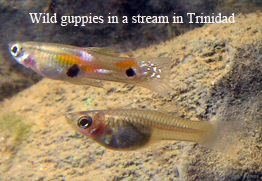
Spies, IB, EC Anderson, K Naish, and P Bentzen. 2007. Microsatellite markers clarify the origin and population structure of Oncorhynchus nerka in the Lake Washington watershed, Washington State, USA. Canadian Journal of Fisheries and Aquatic Sciences 64:1209-1221.
Bradbury, IR and P Bentzen. 2007. Dispersal, life history, and non-linear genetic isolation by distance. Marine Ecology Progress Series 340:255-257.
O’Reilly, PT, MF Canino, KM Bailey and P Bentzen. 2004. Inverse relationship between FST and microsatellite polymorphism in the marine fish, walleye pollock (Theragra chalcogramma): implications for resolving weak population structure. Molecular Ecology 13:1799-1814.
Canino, MF and P Bentzen. 2004. Evidence for positive selection at the pantophysin (Pan I) locus in walleye pollock, Theragra chalcogramma. Molecular Biology and Evolution 21(7):1391-1400.
Larson, S, R Jameson, M Etnier, M Fleming and P Bentzen. 2002. Loss of Genetic Diversity in Sea Otters (Enhydra lutris) Associated with the Fur Trade of the 18th and 19th Centuries. Molecular Ecology. 11:1899-1904
Bentzen, P, JB Olsen, JE McLean, TR Seamons and TP Quinn. 2001. Kinship analysis of Pacific salmon: insights into mating, homing, and timing of reproduction. Journal of Heredity 92:127-136.
Hendry, AP, JK Wenburg, P Bentzen, EC Volk, TP Quinn. 2000. Rapid evolution of reproductive isolation in the wild: evidence from introduced salmon. Science 290:516-518.
Bentzen, P, JM Wright, L Bryden, M Sargent, and KCT Zwanenburg. 1998. Shared pattern of tandem repeat polymorphism and heteroplasmy in the mitochondrial control region of redfishes (Sebastes: Scorpaenidae). Journal of Heredity 89:1-7.
Bentzen, P, CT Taggart, DE Ruzzante, and D Cook. 1996. Microsatellite polymorphism and the population structure of Atlantic cod (Gadus morhua) in the northwest Atlantic. Can. J. Fish. Aquat. Sci. 53:2706-2721.
Links
|

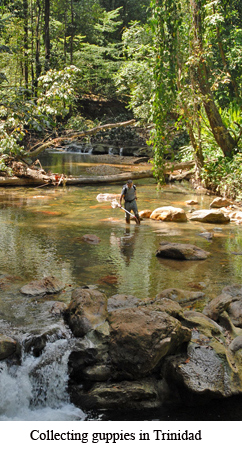

 esearch in my laboratory focuses on the population, evolutionary and conservation genetics of fishes and marine organisms. I am interested in how genetic variation is distributed within and among populations, how historical and ongoing processes have shaped the patterns of genetic variation that exist today, and what contemporary patterns of genetic variation can tell us about the history, ecology, evolutionary attributes and conservation status of populations.
esearch in my laboratory focuses on the population, evolutionary and conservation genetics of fishes and marine organisms. I am interested in how genetic variation is distributed within and among populations, how historical and ongoing processes have shaped the patterns of genetic variation that exist today, and what contemporary patterns of genetic variation can tell us about the history, ecology, evolutionary attributes and conservation status of populations.